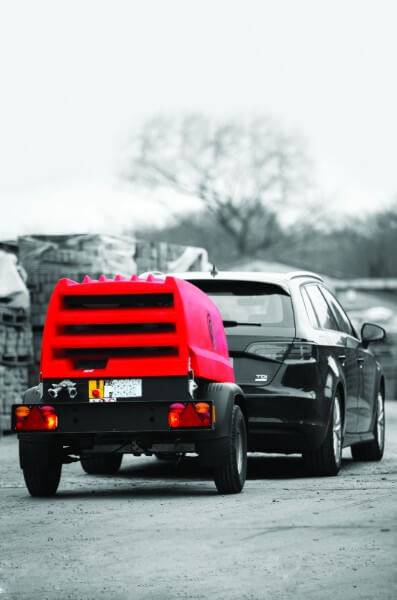Proportioning the Compressed Air Dryer
Trying to figure out which air dryer capacity is best for you? Here are some factors to consider. Read More…
Mobile air compressors are portable, towable compressors particularly useful for applications that suit the construction and roading industry! You'll often see a mobile compressor being used for sandblasting, irrigation blow-outs, and for quarrying tools such as pneumatic block cutters and rock drills.

When you think of an air compressor, most people think about piston compressors or compressors that are stationary. Mobile compressors are portable, easily attached to vehicles or trucks for towing to site, and are almost always diesel powered! They range from very small, to very large and can be offered with electric motors, or are diesel engine powered oil-injected screw compressors.
Today, mobile compressors must demonstrate high overall operational flexibility to serve a range of applications in different environments
based on ambient temperatures, humidity levels, working pressures, altitudes and load cycle profiles. Other requirements relative to mobile
compressors include high operating reliability, good service characteristics, small environmental impact resulting from low noise levels and
regulated exhaust emission levels, compact dimensions and a low total weight.
Mobile compressors initially were used on construction sites and for off-road drilling. You'll see them now being used in many more applications and processes: road repair, pipeline work, rock reinforcement, sandblasting, salvaging operations, etc. Generally, mobile compressors are packaged as standalone compressed air plants with optional, integrated air treatment equipment on-board (aftercooler, water separator, fine filters, reheater, lubricator, etc.) as well as optional auxiliary equipment (5 to 10 KVA electric power generator 230V/400V, cold start aids, anti-theft devices, spillage-free chassis etc). There are mobile, diesel powered electric power generators built in similar enclosures as mobile compressors for larger power requirements.
These days diesel-powered compressors have considerably lower noise levels. These machines can therefore be used without negatively impacting populated areas and areas near hospitals, etc. The silencing enclosure is generally a single-wall steel construction, although double-wall steel and even durable polyethylene enclosures have recently been introduced, containing special baffling and substantial amounts of sound absorbing foam.
In the last 20 years fuel economy has improved substantially by introducing very efficient screw compressor elements and efficient packaging. This has been especially valuable for water well drilling, which is a task that requires the compressor to work intensively over a long period of time. Moreover, modern compressors can be equipped with fuel economy optimizing hardware and software that is far superior to the conventional pneumatic engine/compressor control systems.
Since the introduction of specific exhaust emission legislation in 1997 in the United States, Europe and elsewhere, diesel engines that
comply with latest exhaust gas emission requirements are being chosen more often.
We have a wide range of mobile diesel air compressors available for sale from stock in New Zealand. We offer an mobile portable air compressors for construction applications, and blasting and roadworks. Chicago Pneumatic mobile air compressors are perfect for sandblasting applications and quarrying tools such as pneumatic block cutters and rock drills, and our range is commonly used for handheld drills, surface drilling, abrasive blasting, ice blasting, road work, shotcrete pumping, and general rental/hire. We also supply very efficient towable diesel LED light towers that offer low operating and maintenance costs, low emissions, and low fuel consumption.
Check out our video below about our Red Rock range:
And get in touch today!
Ash Air has been around in New Zealand since 1979, and we’ve grown into a nationwide company with international support and a
reputation for quality and reliability.We look after all things compressed air for your business!
Ash Air's range of Chicago Pneumatic, Alup, Pneumatech, and Quincy compressors are used extensively around the world in industries
ranging from oil and gas to food, automotive and farming, and we bring you these world class compressors here in the land of the long white
cloud.Our technicians are compressed air equipment experts and are dedicated to addressing customer needs. Supported by a 13 locations
nationwide, Ash Air offers one of the widest selections of compressed air equipment and parts available today in New Zealand.
With Ash Air compressors, you can count on reliability and high performance for even the most demanding applications. We focus our
efforts on the following:
Talk to the team today:
Proportioning the Compressed Air Dryer
Trying to figure out which air dryer capacity is best for you? Here are some factors to consider.
Read More…
Maintenance budget: 8 factors to consider
Just like any other equipment, a compressed air installation also requires the necessary maintenance work during its entire
lifespan. Even though maintenance costs are only about 5 to 10% of a machine's annual operating costs, failure to budget for
maintenance can have potentially disastrous consequences.
Read More…
The air dyer is one of the most ignored cooler in the system. A dirty condenser will cause water in the lines, or worse it will cause
complete dryer failure.
Read More…
Do you have an idea for our #expertcorner? Let
us know!
Who we are and how Ash Air can help your business!
Reliability and Efficiency
Read more from our #expertcorner